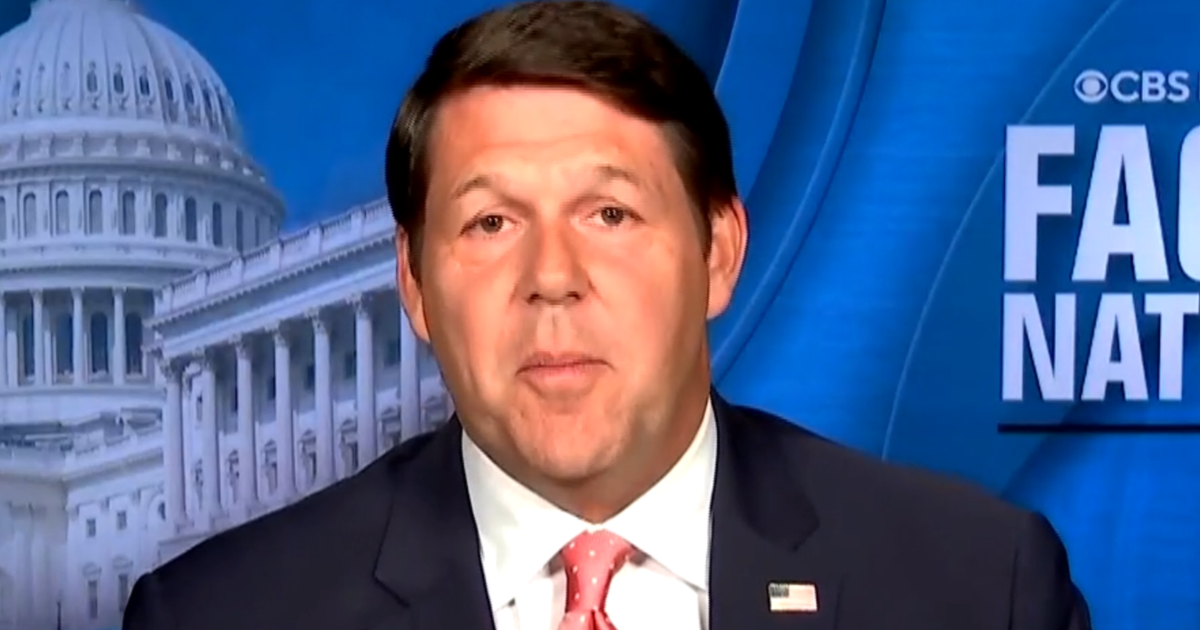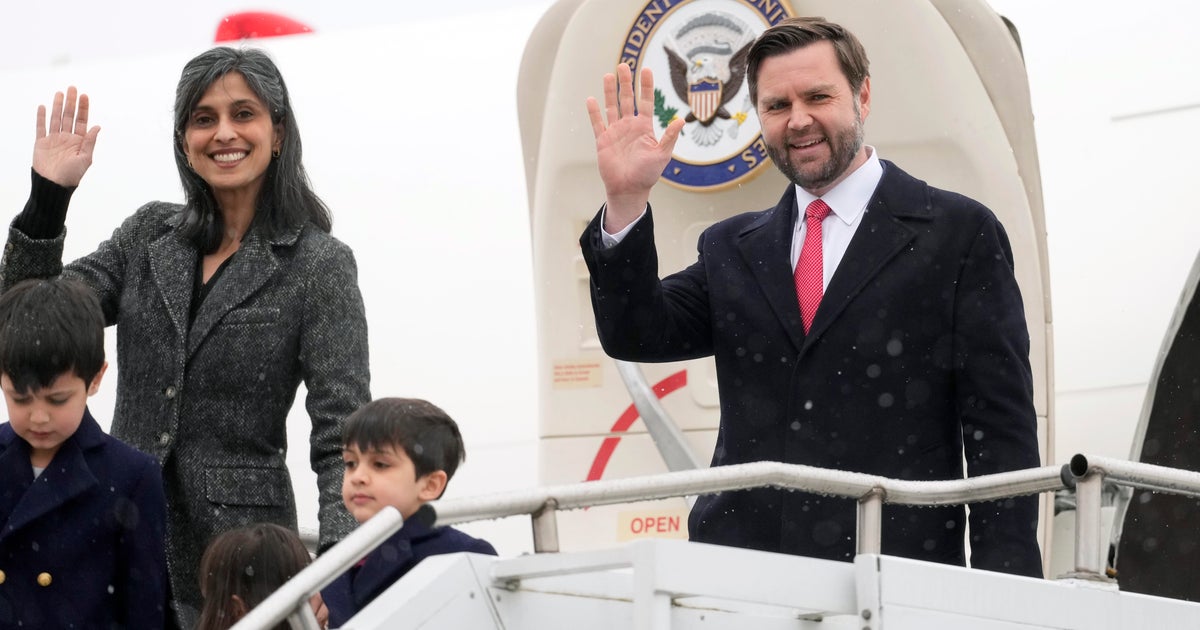The following is the transcript of an interview with House Budget Committee chairman Rep. Jodey Arrington, Republican of Texas, that aired on “Face the Nation with Margaret Brennan” on March 30, 2025.
MAJOR GARRETT: We turn now to the Republican chairman of the House Budget Committee, Texas Congressman Jodey Arrington, who joins us this morning from New Orleans. Mr. Chairman, great to see you. Thanks for joining us. In the last month, the Dow has lost 5.14% of its value, the NASDAQ 8%, the S&P 6.2%. Consumer confidence, as you probably are aware, has dipped a bit in the last couple of months. How do you account for all of this?
REP. JODEY ARRINGTON: Well, good morning to you Major. First of all, core inflation is down. Mortgage rates are down just a little bit. Food and gas prices are down. So you’re going to have fluctuations in in the financial markets, but we’re seeing that the fundamentals are already having an impact on the cost of living, which I think should be job number one of this President, but you’ve got the tariffs, which I think are critical for our long term prosperity to have that reset, have that Fair and reciprocal trade dynamic that doesn’t exist today. So transitioning from the last four years to a new administration with a new economic policy agenda is going to have some adjustments that go with it, and- but I think at the end of the day, you’re going to have better prospects for growth. You’re going to bring down the prices and you’re going to have better prospects for our future, including reducing the debt to GDP, which, as the budget chairman, I can tell you, is completely unsustainable at this point and could bankrupt our country.
MAJOR GARRETT: Mr. Chairman, one of the top tariff advisers to the president, Peter Navarro, said this morning that tariffs are tax cuts. Are they?
REP. ARRINGTON: Well, in the long run, I think having an unfair trade dynamic at the current point is suppressing growth. It’s suppressing wages and suppressing job creation, so it has an adverse impact on our economy. There’s no way, Major, to reset the trade dynamic that we’ve allowed to persist in an unfair way for so long without some disruption. The President has been very transparent about it, and he deployed the same tactics. Now, back in his first administration, successfully, we brought China and others to the table. We had a reset. We had new purchase agreements, we had structural reforms, and we benefited. We had better trade activity, we had better economic activity. And overall, wages grew and life in the American economy, and the quality of life for our fellow Americans was better, so that transition has to happen, and the only person I’ve seen in my life and experience in politics with the political courage to do it has been President Trump, and I support him 100%.
MAJOR GARRETT: When you think about the budget and the process by which to finance tax cuts, either the existing ones or new ones, you’re going to count on tariff revenue, are you not?
REP. ARRINGTON: Well, I think we should count on reducing spending that is runaway, bankrupting levels of spending at $2 trillion in annual deficits that will double in the next 10 years. Half of that $2 trillion is interest on the debt that will more than double in the next 10 years. So, we have a spending problem. That deficit spending is driving World War levels of debt and will bankrupt the country. So, I think we should offset the tax cuts with spending reductions and bend that debt to GDP. The revenue from tariffs could do two things, accelerate the reduction of deficit to GDP and do what the President has said he wants to happen in this America First agenda put our nation on a path to balance, but it can also provide tariff relief like he did in the first administration for farmers in West Texas, for example, with the market facilitation payments that took the sting out of the fallout from the early stages of the trade battles, before we had the reset for reciprocal trade. So, I think those are better uses of tariff revenue, but I think we’ve got to bring down spending. If we don’t, then I don’t know how much longer we have before, as Ray Dalio says, we’re going to have an economic heart attack, and it will undermine everything.
MAJOR GARRETT: Let’s talk about spending for a second. As you know, Mr. Chairman, Medicaid is projected to increase 5.2% each year for the next 10 years. House Republicans have voted for $880 billion in cuts over 10 years. You and I both know you don’t have to argue with me about it, that it would be a reduction of the future growth, not a pure cut, but if you lose a service as a Medicaid recipient, that’s probably a distinction without a difference. Can you say that when this all gets done, alterations to Medicaid will not change the way people access that program and the health services they receive from it?
REP. ARRINGTON: Major, I’ll do better. I think if we don’t make these changes, this program and the federal budget in general is not sustainable, because we’re allowing states and local organizations to siphon hundreds of billions of dollars away from the Medicaid beneficiary and the Medicaid program. We also this is the one means tested program that doesn’t have work requirements for able-bodied adults. We also have a Medicaid program because of the Obamacare expansion and the expansion population of able-bodied adults, where the federal government provides 90 cents on every dollar match for that population, but the preponderance of Medicaid beneficiaries, the blind, the disabled, the poor, the sickest among our fellow citizens, get about 60% to 65% So all of the healthcare system is oriented around the 90% the able bodied adults, and they’re not providing the same access, which is to the- to the traditional Medicaid, which is why the outcomes are going down. So, there is a lot of ways to reorient the system, to make it more efficient, to root out waste and fraud, and it’s well over the $800 billion. It’s common sense, straightforward, and you don’t have to touch a dime of the benefits.
MAJOR GARRETT: Mr. Chairman, very quickly, the President told NBC he “couldn’t care less if foreign automakers raised prices.” Do you care?
REP. ARRINGTON: What I care about is that our workers and manufacturers in this country are competing head-to-head with China and every other competitor country that we allow their mark their products to come in our markets, open and free, and they don’t, they tax our products, and it’s hurting our workers. It’s hurting our economic output, and we need a reset, and so there’s no way to get to that dynamic, that reciprocal trade arrangement, without the tough negotiation tactics of President Trump. He was successful in the first term. We didn’t create economic chaos. We didn’t even have much of inflation. In fact, the economy was roaring. We had more jobs, more people out of poverty. That’s what’s going to happen. And I support the president, and he has to prove that he is committed to this, and I believe he is, and I think that’s important if we’re going to get to the other side of this.
MAJOR GARRETT: House Committee- Budget Committee Chairman Jodey Arrington of Texas. Thanks very much, sir. I appreciate it.



